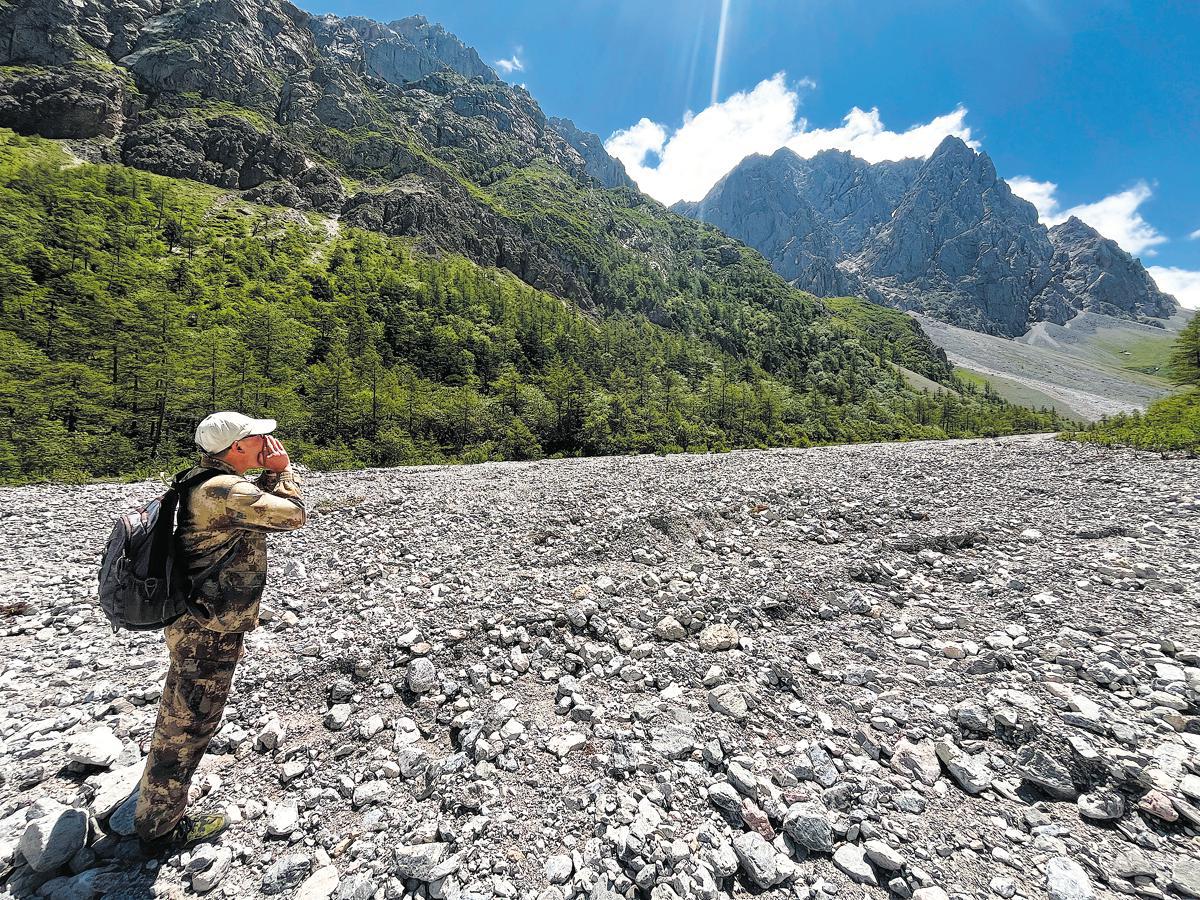Ranger dedicates life to protecting nature
Patrolman braves odds contributing to national effort to conserve wildlife

Editor's note: As protection of the planet's flora, fauna and resources becomes increasingly important, China Daily is publishing a series of stories to illustrate the country's commitment to safeguarding the natural world.

After a long day of work, often involving several hours of hiking through the deep mountains, 48-year-old Liang Chunping enjoys sharing photos of the interesting things he encounters on his WeChat Moments. These include images of blooming orchids or the footprints of an elusive mammal. "Maintaining curiosity and interest is the key to my long-term commitment to my work," he told China Daily.
Liang has served as a ranger at the Wanglang National Nature Reserve in Pingwu county, Sichuan province, for 28 years. He has witnessed its transformation from being one of the country's earliest giant panda reserves to a part of the Giant Panda National Park spanning Sichuan, Gansu and Shaanxi provinces. Constantly learning and absorbing knowledge, he transformed himself from a common road builder to an expert on the reptiles and amphibians that thrive within the park's borders.
Despite developing arthritis from years of trekking through the mountains and exposure to the elements, he remains passionate about his work. In recognition of his outstanding performance and significant contributions to the country's nature conservation efforts, he was honored as a "Good Samaritan of China" in 2023.
A trailblazer
The Wanglang reserve, nestled in the heart of the Minshan Mountains, was established in 1965. Liang's connection to the park with an area of 323 square kilometers runs deeper than a mere job — his father had been one of the reserve's first rangers.
Liang's childhood, he recalls, was filled with experiences of accompanying his father in the mountains. In 1997, after graduating from a technical school without a job lined up, the then 21-year-old Liang was offered a temporary position as a road worker within the reserve.
The reserve, however, didn't always require road repairs. He often helped the rangers with their patrol duties, only returning to road work during the summer months when the paths became damaged.
He started learning the layout of the reserve, the terrain and the trails under senior patrolmen's guidance. He learned how to navigate the mountains without getting lost, identify the signs of large animals, and recognize the trees and common plants.
At the time, scientists from Peking University's School of Life Sciences, including professor Lyu Zhi and her students, were conducting research within the reserve. "We were their field assistants, helping them carry equipment and collect materials," Liang said. "I knew nothing at first, so I would ask questions: 'What plant is this? What kind of animal droppings are those?'"
Gradually, a passion ignited within him. He fell in love with the ranger's work. A temporary gig turned into a 28-year-long commitment.
"Only when you truly step into the mountains do you begin to understand the hardship and difficulties of this work," Liang said.
In 1998, Wanglang was still short of established patrol routes. Liang, along with Zhao Lianjun, who is director of the reserve, and a volunteer, spent over half a year exploring nearly every peak within the reserve.
"We were trying to find walkable paths and identify areas with abundant giant panda activities," Liang said. "We not only established the reserve's permanent survey lines, but also gradually developed its monitoring methods."
From the initial 16 patrol routes, the reserve now boasts 24. The regulations stipulated that each route must be traversed once per quarter, meaning each trail was hiked at least four times a year.
Each patrol took hours of hiking, and Liang, like the other 19 rangers of the reserve, walked more than 2,000 kilometers a year on average.

Hardships and dangers
With an altitude ranging from 2,000 meters to nearly 5,000 meters, patrol routes in Wanglang often rise and fall dramatically. Liang and his colleagues often carried packs weighing more than 15 kilograms, and quickly became drenched in sweat after walking only a few kilometers.
"The more you sweat, the less you want to stop, because when temperatures drop below zero, the sweat freezes, and you experience a 'fire and ice' sensation," Liang said.
Walking through the steep mountains, they faced not only the harsh conditions of high altitude and sudden weather changes, but also the constant threat of wild animals.
One day in December 2016, Liang and a colleague were replacing memory cards and batteries in infrared cameras monitoring wild animal populations when they stumbled upon a wild giant panda on their way down the mountain.
"We were walking on the road when we suddenly heard a 'huffing' sound coming from the bamboo forest on the left. We turned around, and a wild panda with hot air coming out of its nostrils was charging toward us," Liang said. "Our instinctive reaction was: 'Run forward! Rush down!' We ran more than 30 meters in one breath, and when we saw that the panda wasn't chasing us anymore, we slowed down."
Recalling that dangerous scene, Liang still feels a prick of fear.
Last March, while on patrol, he and his colleague encountered a takin, a large species of ungulate that can weigh up to 400 kilograms. "I immediately ran down a steep slope full of bamboo," he said. "My heart was pounding, and I was extremely nervous, because takins are known as killers in the region. Every year, in the Qinling Mountains in Shaanxi, several people are killed or injured by them."
Becoming an expert
During his patrols, Liang would use his mobile phone to record unfamiliar flowers and plants along the way. "The patrolling work is usually boring, but every discovery is a surprise," he said.
Because of his myopia, he said he has difficulty observing birds across the reserve. He is more familiar with animals and plants, and can recognize most traces left by large mammals and identify many trees by name. Over the years, Liang has maintained a habit. After each patrol, he always takes time to record his observations in his work log.
In 2006, Wanglang added amphibians and reptiles to its monitoring scope. At the time, there were no experts in this field within the reserve. Upon hearing the news, Liang managed to get the opportunity to study herpetology at the Chengdu Institute of Biology at the Chinese Academy of Sciences.
Through training at the institute's amphibian and reptile research department, Liang grasped some basic knowledge of herpetology. After returning to Wanglang, he has led the implementation of amphibian and reptile monitoring for 19 consecutive years.
Through continuous learning from fieldwork and researchers from outside, he has grown into the reserve's amphibian and reptile expert.
"Wanglang has more than 60 species of wild mammals, and the monitoring species of amphibians and reptiles has reached eight categories," Liang said.
Since 2020, he has overseen the network of infrared cameras installed in the reserve as part of a collaborative project with a nonprofit conservation organization. Leading a team of rangers, he ensures the regular replacement of memory cards and batteries for these cameras. The stunning footage of the reserve's wildlife, captured by these cameras, has been broadcast on China Central Television, reaching a wide audience.
"At the beginning, there were 95 cameras," he said. "Over the years, 16 of them were either broken or lost in the wild."
Due to his extensive experience in the wild and deep understanding of the reserve's flora and fauna, Liang has become one of the reserve's leading nature education guides. During the summer vacation, he occasionally leads participants on nature education tours, allowing him to earn extra income to supplement his modest salary of just 3,000 yuan ($418) a month.
Despite the limited income, he finds great satisfaction in his work and life at the reserve, enjoying the atmosphere, which he likens to "living like a big family". His wife works as a cook in the reserve's canteen, and the couple follows a schedule of working 20 days in Wanglang before returning to their home in the county town for a 10-day break. Their daughter, after completing her college education, has secured a job at another nature reserve in Pingwu.
"As long as I can, I will continue to guard the forests and the wildlife in Wanglang," Liang said.
chenliang@chinadaily.com.cn
























